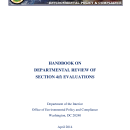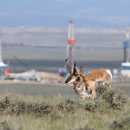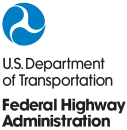States
Alabama, Alaska, Arizona, Arkansas, California, Colorado, Connecticut, Delaware, District of Columbia, Florida, Georgia, Hawaii, Idaho, Illinois, Indiana, Iowa, Kansas, Kentucky, Louisiana, Maine, Maryland, Massachusetts, Michigan, Minnesota, Mississippi, Missouri, Montana, Nebraska, Nevada, New Hampshire, New Jersey, New Mexico, New York, North Carolina, North Dakota, Ohio, Oklahoma, Oregon, Pennsylvania, Rhode Island, South Carolina, South Dakota, Tennessee, Texas, Utah, Vermont, Virginia, Washington, West Virginia, Wisconsin, WyomingThe U.S. Fish and Wildlife Service (Service) recognizes the critical role of transportation in the economic and ecological well-being of human communities. Transportation projects influence the character of a region by the number of people and amount of goods and services it transports. Transportation designs also influence plant and animal species and their habitats, and the ecological health of the nation. The Service encourages the design of transportation projects that provide the greatest value to the greatest number of people, while avoiding or minimizing impacts to plant and animals species and their habitat, as well as the ecological processes that naturally sustain these areas.
In collaboration with the Federal Highway Administration (FHWA), the Service develops policy and guidance products to help facilitate the agency's role in transportation planning. The Service does this in a variety of ways. By gaining a better understanding of local transportation needs, the Service provides technical information that enables the FHWA, State Departments of Transportation, and local transportation planning organizations to develop alternatives with minimal environmental impacts. Through a streamlined environmental review process, Service participation in transportation planning includes:
- involvement in statewide/metropolitan planning processes or Statewide Transportation Plans;
- sharing of data and other information relevant to the integration of conservation and transportation planning;
- identifying and promoting innovative practices that protect threatened and endangered species, migratory birds, valuable habitat and natural areas such as refuges and parks;
- identifying and promoting innovative practices that streamline the environmental review process; and
- promoting partnerships with other federal, state, and local governments and non-governmental organizations to address the efforts above.
Resources
Bipartisan Infrastructure Law (BIL)
FAST Act - Fixing America's Surface Transportation Act
FHWA's Eco-Logical Program - An Ecosystem Approach for Developing Infrastructure Projects






